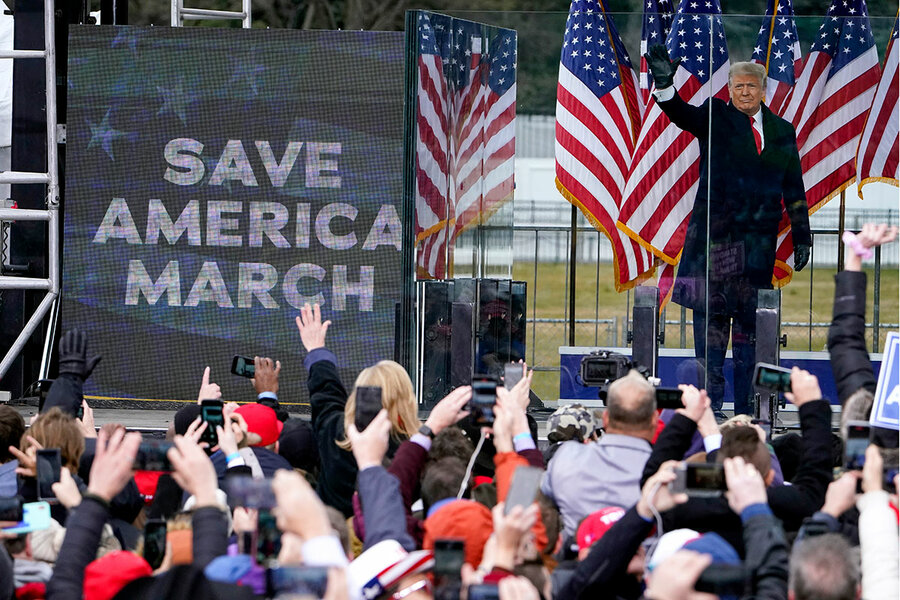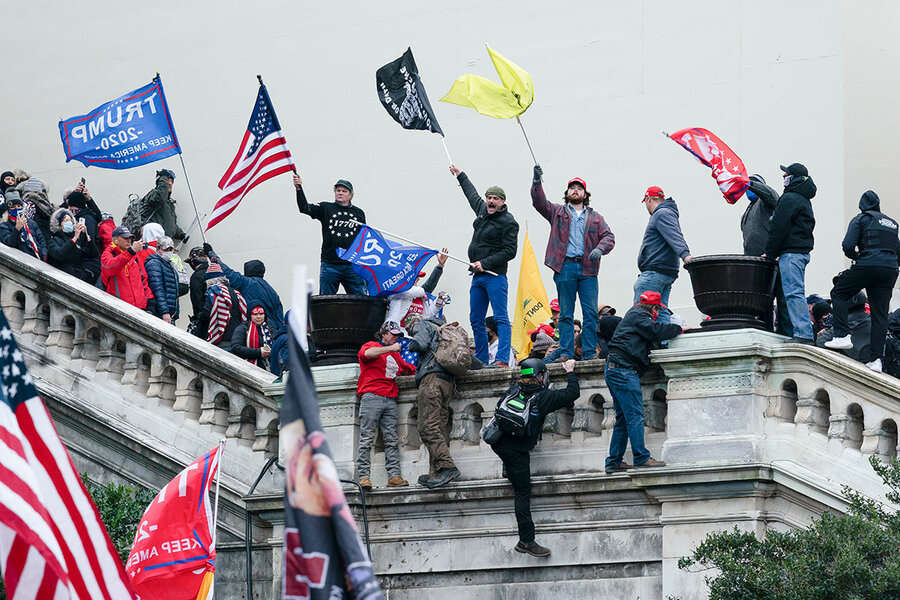Former President Trump indicted on charges tied to 2020 election
Loading...
| Washington
Donald Trump was indicted Tuesday on four felony counts that accuse him of working to overturn the results of the 2020 presidential election in the run-up to the violent riot by his supporters at the U.S. Capitol.
Even in a year of rapid-succession legal reckonings for former President Trump, Tuesday’s criminal case, with charges including conspiring to defraud the United States government that he once led, was especially stunning in its allegations that a former president assaulted the underpinnings of democracy in a frantic and ultimately failed effort to cling to power.
It accuses him of repeatedly lying about the election results, turning aside repeated overtures from some aides to tell the truth but conspiring with others to try to improperly change vote totals in his favor. It says that on the day of the Jan. 6, 2021, riot, he attempted to “exploit” the chaos by pushing to delay the certification of the election results even after the building was cleared of violent protesters.
Mr. Trump’s claims of having won the election, said the indictment, were “false, and the Defendant knew they were false. But the defendant repeated and widely disseminated them anyway – to make his knowingly false claims appear legitimate, to create an intense national atmosphere of mistrust and anger, and to erode public faith in the administration of the election.”
Federal prosecutors say Donald Trump was “determined to remain in power” in conspiracies that targeted a “bedrock function of the United States federal government: the nation’s process of collecting, counting, and certifying the results of the presidential election.”
The indictment, the third criminal case brought against the former president as he seeks to reclaim the White House in 2024, follows a long-running federal investigation into alleged schemes by Mr. Trump and his allies to subvert the peaceful transfer of power and keep him in office despite a decisive loss to Joe Biden.
Mr. Trump is due in court on Thursday before U.S. District Judge Tanya Chutkan.
The criminal case comes while Mr. Trump leads the field of Republicans vying to capture their party’s presidential nomination. It is sure to be dismissed by the former president and his supporters – and even some of his rivals – as just another politically motivated prosecution. Yet the charges stem from one of the most serious threats to American democracy in modern history.
They focus on the turbulent two months after the November 2020 election in which Mr. Trump refused to accept his loss and spread lies that victory was stolen from him. The turmoil resulted in the U.S. Capitol riot on Jan. 6, 2021, when Trump loyalists violently broke into the building, attacked police officers, and disrupted the congressional counting of electoral votes.
In between the election and the riot, Mr. Trump urged local election officials to undo voting results in their states, pressured then-Vice President Mike Pence to halt the certification of electoral votes, and falsely claimed that the election had been stolen – a notion repeatedly rejected by judges.
The indictment had been expected since Mr. Trump said in mid-July that the Justice Department informed him he was a target of its long-running Jan. 6 investigation. A bipartisan House committee that spent months investigating the run-up to the Capitol riot also recommended prosecuting Mr. Trump on charges, including aiding an insurrection and obstructing an official proceeding.
The mounting criminal cases against Mr. Trump – not to mention multiple civil cases – are unfolding in the heat of the 2024 race. A conviction in this case, or any other, would not prevent Mr. Trump from pursuing the White House or serving as president.
In New York, state prosecutors have charged Mr. Trump with falsifying business records about a hush money payoff to a porn actor before the 2016 election. The trial begins in late March.
In Florida, the Justice Department has brought more than three dozen felony counts against Mr. Trump accusing him of illegally possessing classified documents after leaving the White House and concealing them from the government. The trial begins in late May.
The latest federal indictment against Mr. Trump focuses heavily on actions taken in Washington, and the trial will be held there, in a courthouse located between the White House he once occupied and the Capitol his supporters once stormed. No trial date has been set.
Prosecutors in Georgia are investigating efforts by Mr. Trump and his allies to reverse his election loss to Mr. Biden there in 2020. The district attorney of Fulton County is expected to announce a decision on whether to indict the former president in early August.
The investigation of Mr. Trump’s efforts to overturn the 2020 election was led by Justice Department special counsel Jack Smith. His team of prosecutors has questioned senior Trump administration officials before a grand jury in Washington, including Mr. Pence and top lawyers from the Trump White House.
Rudy Giuliani, a Trump lawyer who pursued post-election legal challenges, spoke voluntarily to prosecutors as part of a proffer agreement, in which a person’s statements can’t be used against them in any future criminal case that is brought.
Prosecutors also interviewed election officials in Georgia, Wisconsin, Michigan, and elsewhere who came under pressure from Mr. Trump and his associates to change voting results in states won by Mr. Biden, a Democrat.
Focal points of the Justice Department’s election meddling investigation included the role played by some of Mr. Trump’s lawyers, post-election fundraising, a chaotic December 2020 meeting at the White House in which some Trump aides discussed the possibility of seizing voting machines, and the enlistment of fake electors to submit certificates to the National Archives and Congress falsely asserting that Mr. Trump, not Mr. Biden, had won their states’ votes.
Mr. Trump has been trying to use the mounting legal troubles to his political advantage, claiming without evidence on social media and at public events that the cases are being driven by Democratic prosecutors out to hurt his 2024 election campaign.
The indictments have helped his campaign raise millions of dollars from supporters, though he raised less after the second than the first, raising questions about whether subsequent charges will have the same impact.
A fundraising committee backing Mr. Trump’s candidacy began soliciting contributions just hours after the ex-president revealed he was the focus of the Justice Department’s Jan. 6 investigation, casting it as “just another vicious act of Election Interference on behalf of the Deep State to try and stop the Silent Majority from having a voice in your own country.”
Attorney General Merrick Garland last year appointed Mr. Smith, an international war crimes prosecutor who also led the Justice Department’s public corruption section, as special counsel to investigate efforts to undo the 2020 election and Mr. Trump’s retention of hundreds of classified documents at his Palm Beach, Florida, home, Mar-a-Lago. Although Mr. Trump has derided him as “deranged” and suggested that he is politically motivated, Mr. Smith’s past experience includes overseeing significant prosecutions against high-profile Democrats.
The Justice Department’s investigation into the efforts to overturn the 2020 election began well before Mr. Smith’s appointment, proceeding alongside separate criminal probes into the Jan. 6 rioters themselves.
More than 1,000 people have been charged in connection with the insurrection, including some with seditious conspiracy.
This story is by the Associated Press. AP writers Colleen Long, Zeke Miller, Lindsay Whitehurst, and Michael Kunzelman in Washington contributed to this report.








